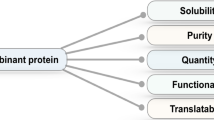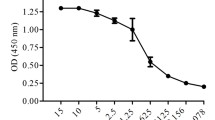Abstract
The murine monoclonal antibody H17E2 recognises placental alkaline phosphatase (PLAP), an antigen present in the human term placenta and also expressed by many tumours. The antibody is of value in both immunoscintigraphy and radioimmunotherapy in testicular and ovarian cancer. The small size of genetically engineered single chain antibodies (SCAs) should give diagnostic and therapeutic advantages of improved tumour penetration and increased blood clearance compared to IgG. Employing recombinant DNA techniques a SCA based on H17E2 has been expressed in Escherichia coli and has been shown to bind placental alkaline phosphatase specifically. When administered to nude mice bearing human tumour xenografts, the H17E2 SCA effectively localised to tumour whilst a co-administered non-specific SCA did not. H17E2 SCA achieves tumour: blood ratios that are superior to those achieved with whole IgG, probably owing to its rapid blood clearance. We conclude that the H17E2 SCA is suitable for further investigation as an agent for clinical imaging and therapy. Additionally, the SCA can also be used for the construction of antibody based fusion proteins to target other effector functions to tumour cells.
Similar content being viewed by others
Author information
Authors and Affiliations
Rights and permissions
About this article
Cite this article
Savage, P., Rowlinson-Busza, G., Verhoeyen, M. et al. Construction, characterisation and kinetics of a single chain antibody recognising the tumour associated antigen placental alkaline phosphatase. Br J Cancer 68, 738–742 (1993). https://doi.org/10.1038/bjc.1993.420
Issue Date:
DOI: https://doi.org/10.1038/bjc.1993.420
- Springer Nature Limited
This article is cited by
-
Targeting the active site of the placental isozyme of alkaline phosphatase by phage-displayed scFv antibodies selected by a specific uncompetitive inhibitor
BMC Biotechnology (2005)
-
Clinical evidence of efficient tumor targetting based on single–chain Fv antibody selected from a combinatorial library
Nature Medicine (1996)
-
Targeting phosphodiesterases as a strategy for killing tumor cells
Cell Biophysics (1994)




